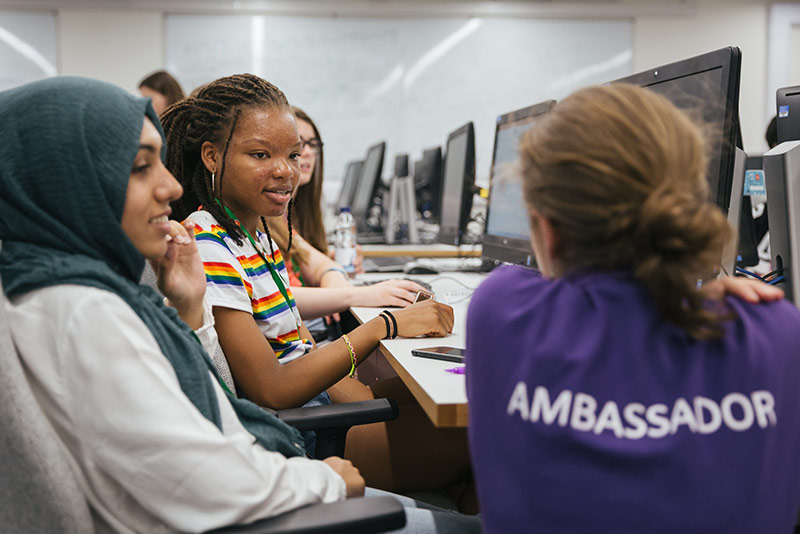Realising potential through outreach and access
Oxford’s work with students and teachers is expanding every year, thanks to the generosity of donors.
A UNIQ experience
Attending a UNIQ summer school changed the course of Anna McKie’s life. ‘I didn’t really think Oxford was an option until I actually came to visit,’ she says. ‘I felt like I had an immediate connection to the city, and getting to experience the course was just fantastic. By the end of the week, I was absolutely convinced that I wanted to study here.’
Anna is one of more than 8,600 young people to have attended a UNIQ spring or summer school since the programme launched nearly ten years ago. Open to pupils from UK state schools and under-represented backgrounds, UNIQ offers a realistic view of Oxford life, with participants staying in colleges, studying their chosen subject, and learning how to make the best possible university application.
 UNIQ student ambassadors are on hand to answer questions and offer support. Photo by Ian Wallman
UNIQ student ambassadors are on hand to answer questions and offer support. Photo by Ian Wallman
Established and later expanded through philanthropy, UNIQ is now the largest access programme of its kind offered by a single UK university. It is also one of the most effective: participants have a 34% chance of making a successful application to Oxford, compared to the average UK rate of about 20%. ‘I felt like the university application process was made much easier because of the support I’d received through UNIQ,’ reflects Anna.
Now a third-year Biomedical Sciences student, Anna has spent the past two summers volunteering as a UNIQ student ambassador. ‘I wouldn’t have even considered applying to Oxford if it hadn’t been for the UNIQ ambassadors I met,’ she explains. ‘Hearing from students who had been in the same position as me was really reassuring. That’s why I’m giving my time now – it’s kind of like paying it forward.’
UNIQ’s expansion, which has seen intake rise from 850 to 1,350 students each year, was funded from the generous donation made to Oxford by the Crankstart Foundation.
Home of the big questions
Do guns hurt more people than they protect? Are humans ruining the Earth? Can money ever buy happiness? These are just three of the 51 ‘big questions’ that feature on the website Oxplore, an innovative portal through which young people and potential applicants to the University can learn about and debate some of the trickiest issues of our time.
Guided by the expertise of Oxford academics, users are encouraged to consider fresh perspectives, and read and explore subjects further for themselves. The aim is to promote super-curricular learning – that which goes above and beyond schoolwork and exams – in order to raise aspirations, promote broader thinking and stimulate intellectual curiosity.
 Exploring Oxplore. Photo by John Cairns
Exploring Oxplore. Photo by John Cairns
Reaction to the initiative, which has been supported by donor Anthony Clake, has been overwhelmingly positive. Since its launch in 2017, more than 250,000 people have accessed the site, with users viewing over 650,000 pages and submitting approximately 1,500 questions of their own. The Oxplore team have also run a number of popular online events, through which young people can interact directly with Oxford tutors and students.
Work is now underway to engage with teachers over their use of Oxplore in the classroom. ‘We use it regularly as part of our mission to support a culture of high aspiration, independence and challenge,’ says Tom Allen, from Burton Borough School in Shropshire. ‘The resources are broad, so you can delve in as far as you want and keep finding new ideas.’
A foundation for success
‘I was lucky enough to be offered a place on the Foundation Year and accepting it was the best thing I could have done for myself academically,’ reflects Beulah Amponsa, now a second-year Psychology student at Oxford. ‘I got to study a subject I love, while learning how to become a better undergraduate student.’
Established in 2016, Lady Margaret Hall’s innovative Foundation Year has been designed to help young people from under-represented backgrounds reach their academic potential. The fully funded, year-long course gives students the essential academic skills and confidence they need to thrive, either at Oxford or at any other highly selective university.
Each Foundation Year student receives more than 100 hours of tuition, studying a specially devised curriculum in their chosen subject. ‘The majority of contact hours came from tutorials,’ explains Beulah, who belonged to the 2017/18 Foundation Year cohort. ‘I didn’t consider myself the most eloquent speaker, but once my confidence grew, the ability to articulate my thoughts really improved.’
 Former Foundation Year student Beulah Amponsa
Former Foundation Year student Beulah Amponsa
The Foundation Year has already proven hugely successful, with 100% of those belonging to the first three cohorts receiving offers to study at Russell Group universities – the vast majority matriculating as Oxford undergraduates. Encouraged by these results, the University announced plans earlier this year to develop pioneering Oxford-wide access programmes inspired by the Foundation Year, along with the bridging scheme developed by University College.
Beulah says her time at Lady Margaret Hall helped her to visualise life as an Oxford undergraduate: ‘Although progression onto the undergraduate course wasn’t guaranteed, the year increased my confidence in my academic ability and made me realise how much I loved studying my subject. After being on the Foundation Year, I couldn’t see myself studying anywhere else.’
The Foundation Year has been funded by alumni of Lady Margaret Hall.
SUPPORT OUTREACH AND ACCESS